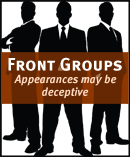Dealing with the Issues Indirectly: Constituencies
|
This article is part of the Tobacco portal on Sourcewatch funded from 2006 - 2009 by the American Legacy Foundation. |
|
This article is part of the Center for Media & Democracy's spotlight on front groups and corporate spin. |
This 67-page document is a transcript of a Philip Morris Corporate Affairs World Conference held in Rye Brook, New York in 1984. The audience consisted of PM Corporate Affairs office managers from the company's offices around the world. The transcript contains a lecture by Alan Miller of PM's marketing department describing a "constituency system," or third-party technique, that Philip Morris uses to manipulate legislation, defend itself socially and politically and neutralize its enemies. Miller describes how PM uses this system to achieve credibility, power, and leverage and to gain access where the company could never otherwise gain access.
Miller tells the audience that to be successful in using this system, PM employees must be creative and be willing to:
...create vehicles to ride on, to put things together, in fact, to invent things that didn't exist before: coalitions, associations, institutes, seminars, meetings, all kinds of things like that.
Miller describes the company's efforts to build long-term relationships not only with potential allies, but also with its most credible enemies, in order to neutralize them. He likens the process to a savings account:
It's like a savings account. The analogy is an important thing. One has to keep making deposits into the savings accounts. Goodwill deposits, deposits of getting to know people, deposits of listening to their problems...And you make those deposits into the savings account so that when you have to make a withdrawal, the bank balance is there. You can never put yourself in the position of having to go to a third party, an uninvolved party on an immediate basis and hope they drop everything and come to your defense. It isn't going to work. You have to try to understand whom you have to neutralize in advance, who is a potential threat to you and then how do you make common cause with that category of individuals or companies or group or whathaveyou so that you can neutralize them.
Miller describes how PM and the Tobacco Institute cultivated a beneficial relationship with one of their most powerful potential enemies, the National Fire Service, around the issue of fire-safe cigarettes, in order to neutralize their opposition and turn them into allies:
Example. The self-extinguishing cigarette. Who would normally be involved in the self-extinguishing cigarette on the other side of the fence? Probably the fire-fighting community. As you know in the United States, we have put a huge amount of time into helping all the organized groups of professional and volunteer fire-fighters. They get such help from us that is monumental. And then when we need them to stand up and say, not cigarettes that cause fire in 99.9 percent of the cases, we get their cooperation. But that's because we have cultivated them and helped them achieve some of their goals and we have seen that they are a potential enemy that has real credibility. That's the greatest credibility, your potential enemy. We had turned them around and made allies, third party defenders for ourselves. All of this involves a process of logic. To find common ground, to find your natural friends; to find your natural enemies and if possible, the ways in which you can neutralize them...
The speaker describes how PM finds the third parties it will cultivate, saying the company begins by approaching vendors with whom it does a minimum of $100,000 worth of business a year, bankers, trade associations and groups to whom the company gives money. He describes the company's food and drink subsidiaries as "constituencies." As an example he cites the Southland Corporation, which operates 7-11 Convenience stores throughout the country. The chain sells PM's cigarettes, soft drinks, etc. He cites PM's ability to "activate" 7-11 store managers around a given state when necessary to generate letters to elected officials opposing bills that would require deposits on bottles or cans.
The transcript gives significant insight into how corporations develop and apply the third-party technique.
Title: Philip Morris Incorporated 840000 Corporate Affairs World Conference Rye Brook, New York 840913 Workshop - Dealing with the Issues Indirectly: Constituencies
Author: Joe Blake; J. Dowling; Dale Florio; William Merritt; Alan Miller; Timothy Rothermel; George Woodward
Date: September 13, 1984
Type: Transcript
Bates No.: 2025421934/2000
URL: http://legacy.library.ucsf.edu/tid/fxz88e00

